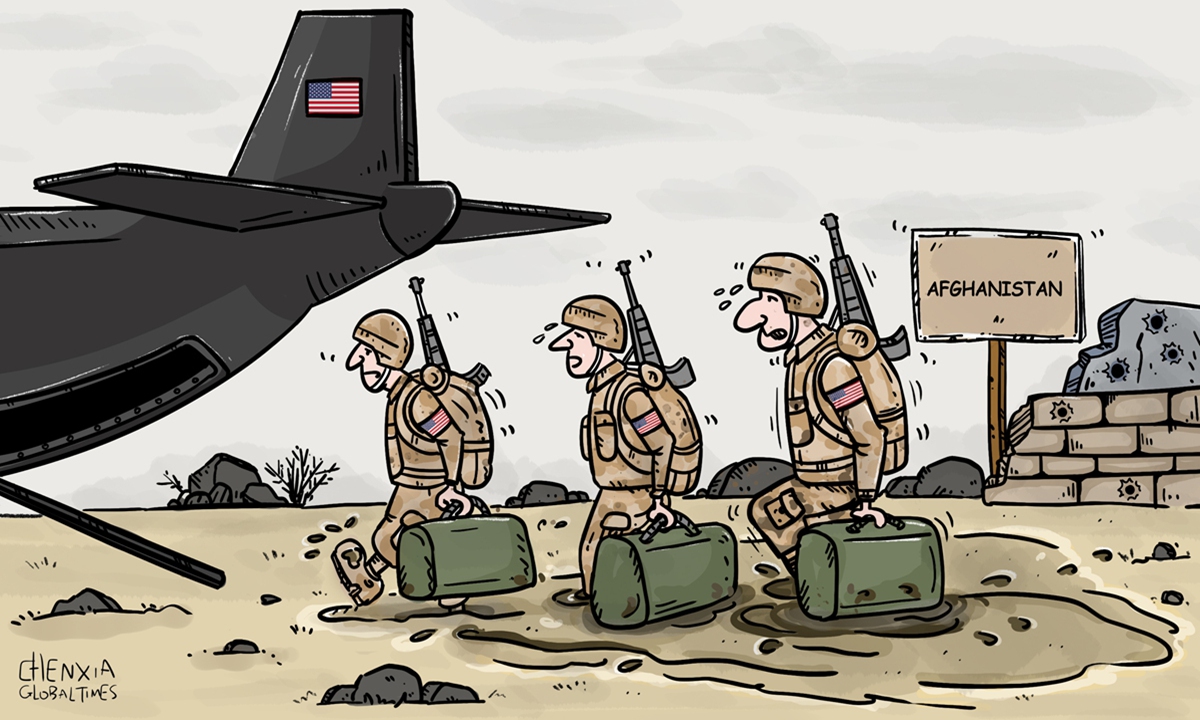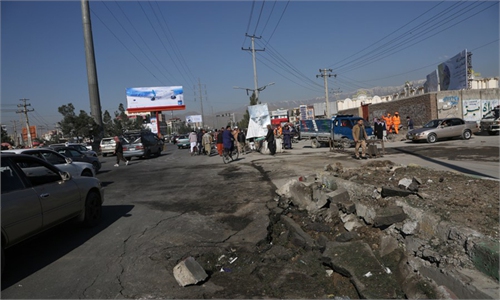
Illustration: Chen Xia/GT
Some US media outlets have labeled the US withdrawal of its troops from Afghanistan as an opportunity for China. For example, CNN on Friday posted an article titled "As US pulls out of Afghanistan, China sees opportunities - and potential for chaos." In a report on April 20, VOA Chinese said that the US withdrawal of troops from Afghanistan can be seen as an opportunity for China. And China can exploit this opportunity to integrate Afghanistan into its economic circle. This article also raised concern over whether China will send troops to Afghanistan after the US withdrawal.
Quite a few political and media elites in the US disapprove of the US pulling out its troops from Afghanistan. By hyping that it will create an opportunity for China, the US' main strategic rival, they are expressing their dissatisfaction. Given the tone of public opinion toward China in the US now, such a narrative may seek to trigger discontent from more Americans, observers said.
Actually, Afghanistan is in economic turmoil. And its missions in economic recovery and post-war reconstruction are daunting. Against this backdrop, Afghanistan's economic cooperation with China is limited. Only when the domestic situation stabilizes can Afghanistan achieve a win-win result by coordinating with other countries in the economy and other domains. But the US' hasty withdrawal will worsen the overall security situation in Afghanistan, affect the national security of neighboring countries including China, and negatively impact regional stability. In this context, what the US' withdrawal from Afghanistan brings to China is grave challenges, instead of opportunities.
The US has repeatedly stirred up troubles in China's surroundings on issues such as Afghanistan, Myanmar and the China-India border, in a bid to create instability around China, and then affect China's development.
It is noticeable that when US officials explained why Washington decided to withdraw troops from Afghanistan, the US attempted to link China to this as well. US Secretary of State Antony Blinken on April 18 said that withdrawing US troops from Afghanistan meshes with the Biden administration's goal of focusing resources on China and the COVID-19 pandemic, according to Bloomberg.
In the US, adopting a hardline stance toward China has become "politically correct." And the US is trying to contain China's development in all directions. Both supporters and opponents of the withdrawal cite China as a cause to justify themselves and rally more support. This reflects the sinister and deep-seated Cold-War mentality of some Americans, which is detrimental to tackle the Afghanistan issue and achieve regional stability.
China underlines that the Afghan issue can only be resolved by political means, and the future of Afghanistan should be kept in the hands of the Afghan people. China is willing to collaborate with all parties and play a constructive role in realizing peace and stability in Afghanistan as soon as possible. Accordingly, China has taken pragmatic measures. For example, the Shanghai Cooperation Organization (SCO), of which China is one of the founding members, decided to grant Afghanistan observer status in 2012, providing a platform to stabilize Afghanistan's security.
In comparison to China, the US is not really concerned whether political reconciliation can reach in Afghanistan, whether there will be a civil war, or whether terrorist forces will return, observers believed. From the perspective of the US, Afghanistan is only a part of its global strategy, but is no longer the priority. The US is likely to leave Afghanistan with a mess on its hands. It is only to be hoped that regional countries, the SCO, the UN and other regional or global multilateral organizations will work with the Afghans to mitigate the impact of the US withdrawal and explore a path that fits the national conditions of Afghanistan.

